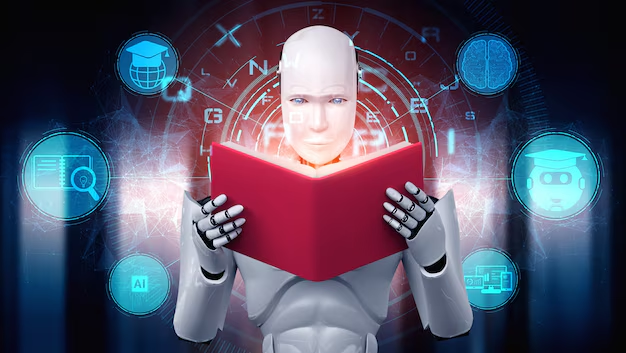AI in Education: Artificial Intelligence (AI) is reshaping various industries, and education is no exception. AI-driven technologies are revolutionizing the way students learn and educators teach, creating more personalized and efficient learning experiences. From intelligent tutoring systems to automated grading, AI is paving the way for a smarter and more accessible educational environment.
This article explores how AI is transforming education, its benefits, challenges, and future prospects.
The Role of AI in Education

AI plays a crucial role in modernizing education by enabling adaptive learning, enhancing accessibility, and automating administrative tasks. Below are some key ways AI is making an impact:
1. Personalized Learning
AI-powered learning platforms analyze student performance and adapt content based on individual needs. Personalized learning ensures that each student receives a customized curriculum that aligns with their strengths and weaknesses.
2. AI-Powered Tutors and Chatbots
AI-driven tutoring systems provide instant assistance to students, answering their questions and explaining concepts in a human-like manner. Chatbots also help with administrative inquiries, reducing the burden on teachers.
3. Automated Grading and Assessment
AI can automate the grading of multiple-choice tests, essays, and assignments. This saves educators time, allowing them to focus more on teaching rather than administrative tasks.
4. Smart Content Creation
AI assists in generating educational content, including interactive quizzes, summaries, and study guides. AI-powered platforms can also convert traditional textbooks into digital formats with additional multimedia features.
5. Enhancing Accessibility
AI-powered tools provide support for students with disabilities. Speech-to-text technology, language translation, and text-to-speech applications help create an inclusive learning environment.
6. AI in Administrative Tasks
AI streamlines administrative processes such as student enrollment, scheduling, and managing records. This helps institutions reduce workload and improve efficiency.
7. Predictive Analytics for Student Performance
By analyzing student data, AI can predict academic performance and identify students at risk of dropping out. Educators can then intervene early and provide the necessary support.
8. Gamification and Interactive Learning
AI-driven educational games and simulations make learning more engaging. These interactive tools help students grasp complex subjects through experiential learning.
9. AI-Powered Virtual Classrooms
With the rise of online education, AI enhances virtual classrooms by offering real-time feedback, automated attendance tracking, and AI-generated lecture summaries.
10. Fraud Detection and Plagiarism Checking
AI algorithms can detect plagiarism in student assignments and research papers, ensuring academic integrity. It also identifies fraudulent activities in online examinations.
Challenges of AI in Education

While AI offers numerous benefits, its implementation comes with certain challenges:
1. High Implementation Costs
Adopting AI-based solutions requires significant investment in technology and infrastructure, which may be unaffordable for some institutions.
2. Privacy and Security Concerns
AI systems collect and store large amounts of student data, raising concerns about data security and privacy protection.
3. Lack of Human Interaction
While AI can provide instant responses, it cannot replace the emotional intelligence and motivation that human teachers offer.
4. Ethical Issues
The use of AI in education raises ethical concerns, such as bias in AI algorithms and data misuse.
5. Training and Adaptation
Educators and students need proper training to use AI-powered tools effectively. Some may struggle to adapt to the new technology.
The Future of AI in Education

The future of AI in education looks promising, with advancements in:
- Adaptive Learning Platforms: AI will continue to refine personalized learning, making education more effective for students worldwide.
- AI-Driven Career Guidance: AI can help students choose career paths based on their skills, interests, and job market trends.
- Immersive Learning with AR/VR: AI will integrate with Augmented Reality (AR) and Virtual Reality (VR) to create interactive and immersive learning experiences.
- Global Education Accessibility: AI-powered platforms will bridge educational gaps, making quality learning accessible to students in remote areas.
Also Read : The Role Of AI In Business: Automation, Analytics, And Growth
Conclusion
AI is revolutionizing education by making learning more personalized, efficient, and accessible. While challenges exist, the benefits of AI in education far outweigh the drawbacks. As technology continues to advance, AI will play an even more significant role in shaping the future of education.
Educational institutions must embrace AI responsibly, ensuring that it complements human teaching rather than replacing it. With the right approach, AI can create a brighter future for students and educators alike.
FAQs
1. How is AI used in education?
AI is used in education for personalized learning, automated grading, tutoring, administrative tasks, accessibility enhancements, and predictive analytics.
2. Can AI replace teachers in the future?
No, AI cannot replace teachers but can assist them by automating administrative tasks and providing additional support to students.
3. What are the benefits of AI in education?
AI improves learning experiences through personalization, efficiency, accessibility, and automation of tasks.
4. Is AI safe to use in schools?
AI is safe when implemented with proper data security measures and ethical considerations.
5. How can AI help students with disabilities?
AI-powered tools like speech-to-text, text-to-speech, and language translation enhance learning accessibility for students with disabilities.
6. What are the challenges of AI in education?
Challenges include high costs, data privacy concerns, lack of human interaction, ethical issues, and the need for training.
7. How does AI impact online learning?
AI enhances online learning through virtual classrooms, automated grading, personalized content, and real-time feedback.
8. Can AI detect plagiarism in student assignments?
Yes, AI-powered plagiarism detection tools help maintain academic integrity by identifying copied content.
9. Will AI make education more expensive?
Initially, AI implementation may be costly, but in the long run, it can reduce costs by automating tasks and increasing efficiency.
10. What is the future of AI in education?
The future includes more advanced personalized learning, AI-driven career guidance, immersive AR/VR learning, and increased global accessibility to education.

